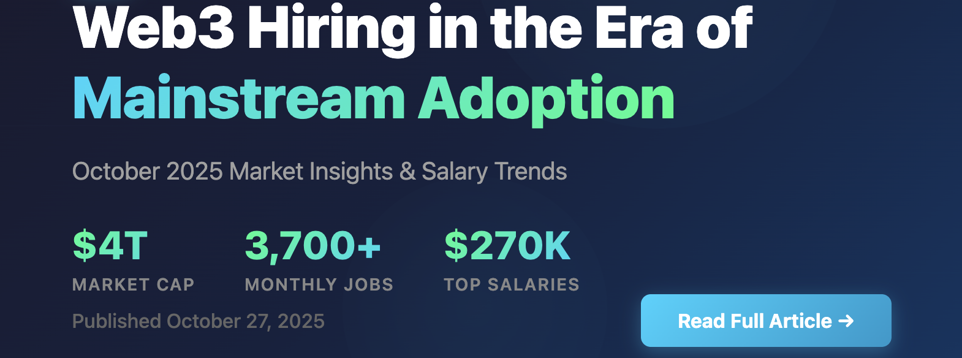Web3 Hiring in the Era of Mainstream Adoption

Web3 Hiring in the Era of Mainstream Adoption
Date: 27 Oct 2025
After weathering one of the most challenging periods in crypto history, October 2025 marks a watershed moment for the industry, and for Web3 talent acquisition. With Bitcoin hovering above $110,000, the total crypto market capitalization surpassing $4 trillion, and stablecoins processing $46 trillion in annual transactions (nearly 3x Visa's volume), we're no longer operating in an experimental corner of finance. We're building the infrastructure of the global digital economy.
But here's what two decades in recruitment has taught us: Bull markets don't just create opportunities, they expose who's prepared and who's scrambling. The companies winning the talent war right now aren't the ones with the flashiest token prices. They're the ones who built disciplined hiring processes during the bear market and can now scale intelligently.
Let us break down what we're seeing on the ground and what it means for both employers and candidates navigating this historic moment.
The Infrastructure Shift: Building for Institutions, Not Just Hype
The narrative has fundamentally changed. When BlackRock, JPMorgan, and Fidelity aren't just dabbling but actively launching crypto products, when S&P Global creates a Digital Markets 50 Index combining equities and cryptocurrencies, when Goldman Sachs is tokenizing investment products, we're past the point of proving blockchain's legitimacy.
Stablecoins now settle over $46 trillion in annual transactions, rivaling Visa and PayPal, with stablecoin supply reaching record highs over $300 billion. More than 1% of all U.S. dollars now exist in tokenized form on public blockchains, and stablecoins collectively hold $150 billion in U.S. Treasuries, making them the 17th-largest holder globally.
What does this mean for hiring? The skills gap has shifted dramatically.
We're no longer hiring for:
- "Growth hackers" chasing viral NFT drops
- Community managers focused purely on Discord engagement metrics
- Developers building isolated, experimental dApps
We're now hiring for:
- Compliance officers who understand MiCA, the GENIUS Act, and Singapore's licensing frameworks
- Protocol engineers building cross-chain infrastructure that institutions will rely on
- Product managers who can translate complex DeFi primitives into user experiences your parents can navigate
- Treasury and risk management professionals who understand both TradFi and DeFi
- Legal specialists who can structure tokenized securities that pass regulatory scrutiny
The projects that survived crypto winter did so because they hired strategically, not opportunistically. Now that capital is flowing again, those teams are positioned to scale while others are playing catch-up.
The Talent Landscape: Demand, Salaries, and Where the Jobs Actually Are
Let's talk numbers. Over 3,700 new Web3 positions are being added monthly right now, with 70% of placements being remote roles. Since 2023, the web3 job market has seen a 300% surge in job openings by 2025.
But here's the interesting part: Project & Programme Management has become the highest-demand role category, representing over 27% of all postings. For an industry supposedly built on revolutionary technology, why are companies hiring more coordinators than creators?
The answer reveals maturity. During the building phase (2020-2022), value creation was about technical breakthroughs. Companies needed brilliant individuals to solve novel problems. In the execution phase (2023-2025), value creation is about orchestrating complexity. Companies need to integrate multiple blockchains, navigate regulatory frameworks, serve enterprise clients, and coordinate globally distributed teams.
Current Salary Benchmarks (October 2025):
According to recent hiring data, here's what top Web3 roles command:
- Blockchain Developer: $130,000 – $270,000 + equity/tokens
- Crypto Compliance Officer: $110,000 – $240,000 + equity/tokens
- DeFi Analyst: $100,000 – $175,000 + incentives
- Marketing Lead: $85,000 – $165,000 + equity/tokens
- AI & Web3 Engineer: $140,000 – $250,000 + incentives
But salaries don't tell the whole story. Token grants, remote flexibility, learning velocity, and mission alignment matter enormously. The best candidates we're placing aren't optimizing for the highest base salary, they're optimizing for the right opportunity at the right stage with the right team.
The AI x Crypto Convergence: A New Tier of Talent
One of the most significant trends we're tracking is the convergence of AI and blockchain. Outlier Ventures reports a 60% hiring increase in AI + Web3 roles since late 2024. The percentage of job descriptions requiring AI workflows has grown from 2% in 2021 to 14% in 2025.
But here's what that statistic understates: AI integration is now baseline competency, not a differentiating factor. The candidates who'll command premiums aren't those who dabble in both, they're the rare engineers who live at the intersection and understand how AI agents need payment rails, identity systems, compute resources, and data marketplaces.
The narrative around AI agents potentially creating a $30 trillion economy by 2030 isn't science fiction, it's infrastructure planning. And the infrastructure being built right now will determine who wins that market.
Regulatory Clarity as Competitive Advantage
Here's a contrarian take: Regulation is your moat, not your constraint.
The GENIUS Act passed. MiCA is in full effect across Europe. Singapore's licensing requirements are active. These aren't obstacles, they're filters that separate serious projects from everyone else.
The best compliance and legal talent we're placing right now aren't saying "no" to everything, they're helping shape products that can partner with institutions, access broader markets, and build sustainable business models. Companies that view compliance as a competitive advantage are attracting institutional capital while others hit walls and pivot constantly.
Early compliance hiring isn't about playing defense. It's about opening doors your competitors can't access.
Remote Work Reality: The Pendulum Swings Back
2025 has seen a 50% reduction in remote jobs year-over-year, representing a structural shift rather than temporary correction. Most companies have settled on hybrid models balancing flexibility with collaboration needs, with the sweet spot appearing to be 3-4 days in office.
But Web3 remains more remote-friendly than most industries. 70% of web3 job placements in 2025 are still remote. The talent pools we're tapping are genuinely global, with crypto-friendly hubs like Dubai, Singapore, Portugal, and Miami emerging as talent magnets.
Here's what matters: Companies that default to remote but do it poorly (endless Zoom meetings, no documentation, timezone chaos, "always available" culture) are losing talent to companies that have mastered async communication, written culture, and outcomes-based work.
The best remote Web3 teams aren't trying to replicate office culture via video calls. They've fundamentally rethought how distributed teams create value.
What Smart Employers Are Doing Right Now
After placing hundreds of candidates across protocols, exchanges, DeFi platforms, and infrastructure companies, here's what the winners are doing differently:
1. They're Moving Fast The best candidates are off the market in 10-14 days. If your interview process takes longer than three weeks, you're losing top talent to faster decision-makers. Streamline ruthlessly.
2. They're Transparent About Compensation Salary ranges are posted upfront. Token economics are explained clearly. Vesting schedules are straightforward. Playing coy about comp in 2025 is a losing strategy.
3. They're Hiring for the Team They Need, Not the Team They Know Nepotism is rampant in crypto because shared history creates shorthand. But your buddy who crushed it at an NFT project in 2021 might not be the right product leader for your DeFi protocol in 2025. Hire the best person for the role, not the most familiar.
4. They're Selling Mission, Not Just Money Compensation gets people in the door. Purpose keeps them there. The best candidates we're placing are turning down higher offers to work on missions they believe in. If you can't articulate why your project needs to exist beyond "token go up," you'll struggle to compete.
5. They're Building While Others Rebrand The protocols that kept shipping through the bear market built trust. They demonstrated resilience. They showed their mission wasn't dependent on token price. Those teams have first pick of talent right now because candidates remember who stayed committed.
What Smart Candidates Are Doing
On the flip side, here's what the candidates landing the best opportunities are doing:
1. Their GitHub Speaks Louder Than Their Resume Commit history over the last 12-18 months matters more than job titles. Contributions to public repos signal continuous learning. The quality of code, not just quantity, demonstrates craft. In Web3, your reputation is on-chain and on-GitHub. Make sure it tells the right story.
2. They Ask Hard Questions
- "What's your burn rate and runway?"
- "What happened to your team during crypto winter?"
- "How do you handle disagreements about technical direction?"
- "Why did the last person in this role leave?"
These aren't red flags. They're green flags. It means they're doing due diligence and care about making the right decision, not just getting any job.
3. They're Strategic About Applications Spray-and-pray doesn't work. The best placements we make are with candidates who applied thoughtfully to 5-10 companies they researched deeply, not 100 companies they barely glanced at.
4. They Negotiate The candidates who negotiate aren't greedy, they know their worth. And those are exactly the people teams want. Self-advocacy translates to product advocacy.
5. They Build in Public Side projects matter. Personal experiments signal curiosity. Hackathon participation demonstrates craft. Someone with "built three side projects, contributed to five OSS repos, and shipped a tool that 100 people use" is more interesting than someone with a fancy job title and an empty GitHub.
Looking Ahead: What's Next for Web3 Hiring
We're at an inflection point. The next 12-18 months will separate the projects that become infrastructure from the ones that fade into obscurity.
Here's what we're tracking:
The Layer 2 Wave Base, Arbitrum, Optimism, and emerging L2s are gaining massive traction. But most developers only know Ethereum mainnet. The talent who deeply understand L2-specific gas optimization, bridging complexity, and cross-chain UX will command premiums.
The Security Imperative One vulnerability can end a project. Yet most teams still don't have dedicated smart contract auditors. Security can't be outsourced to point-in-time audits—it needs to be embedded in the development process from day one.
The DeFi Evolution DeFi is maturing beyond APY chasing and governance token speculation. The protocols winning are hiring risk management professionals, sustainable tokenomics designers, and institutional relationship builders. DeFi is becoming actual financial infrastructure.
The Compliance Advantage As regulatory frameworks solidify globally, the companies that embrace compliance early are opening doors competitors can't access. This isn't a defensive move, it's offensive strategy.
Final Thoughts: Play the Long Game
Twenty years in recruitment has taught us this: Great hires don't come from algorithms, keyword matching, or automated screening. They come from conversations, real conversations where you understand what someone wants, what drives them, what they're exceptional at, and why this opportunity might actually matter to them.
We're in a bull market. Opportunities are everywhere. Capital is flowing. But the companies that win long-term are the ones building teams that can execute through any market condition.
For employers: Hire like you're building for a decade, not a quarter. Move fast, but be thoughtful. Sell mission, not just money. Build the team you need, not the team you're comfortable with.
For candidates: Optimize for growth and fulfillment, not just salary. Ask hard questions. Do your due diligence. Build in public. Show, don't just tell.
The infrastructure being built right now will power the next era of the internet. Make sure you're building it with people who'll be there when it matters most.
Ready to hire smart — or be hired into something big?
Let’s talk. HERE
No fluff. No filters. Just honest recruiting in Web3.
Still struggling to stand out?
Neil offers one-on-one career consultations to help you get clear, get seen, and get hired. HERE
Looking for a job? Reach out to us HERE
Back to News Share to LinkedIn
Share to LinkedIn Share to Twitter
Share to Twitter Share to Facebook
Share to Facebook Back to news
Back to news




